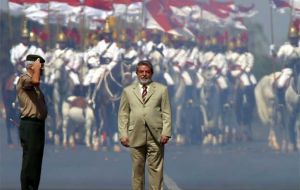MercoPress. South Atlantic News Agency
Lula da Silva woos and boosts Brazilian armed forces
 Lula reviews a military formation
Lula reviews a military formation Brazil announced this week the creation of an ambitious defense structure, to be deployed in the event of foreign aggression, which includes ten ministries under the command of the Defence ministry, reports O Estado de Sao Paulo.
The move is also seen as an attempt to boost the military establishment spirit after long years of erosion under democratic rule following decades of military intervention in politics. The National Mobilization System, Sinamob, became effective last December 28 and was the result of four years of congressional debate following on an initiative from President Lula da Silva, a few months after taking office for the first time in 2002. Sinamob is synonymous of "rapid response" and gives the Brazilian president special powers to decree national mobilization against a foreign aggressor. The president is entitled to inform Congress before or after the decision has been taken. The ministries involved are Defence, Justice, Foreign Affairs, Planning and Budget, Science and Technology, Economy, National Integration, the Executive Secretariat, Security Council and the Executive's Communications Secretariat. But why Brazil that has not been involved in any war for over sixty years and has suffered no aggression since the Paraguay conflict in the second half of the XIXth century should decide on a system which can impose mandatory civilian recruitment, expropriation of goods and services, forcing government companies to join the war effort and intervention in the private and government production process. According to O Estado de Sao Paulo Sinamob has the purpose of filling a legal vacuum existent since World War II during the XXth century. Since then Brazilian military have participated in United Nations and Organization of American States peace missions, but following the traumatic dictatorship of the sixties and with the return of democracy, military influence has consistently eroded and so has military presence in the cabinet and its budget share. In 2002 on the campaign trail Lula da Silva, candidate for the Socialist Workers Party promised to revamp the Armed Forces and even publicly praised the economic policies of the military regimes arguing that they had shown "a vision of future", thus also criticizing the political establishment whose sight is limited to winning the next election. Finally, President Hugo Chavez is investing heavily in the Venezuelan Armed Forces and at the same time exposing the vulnerability of Brazilian forces. Of the 719 aircrafts of the Brazilian Air Force only 217 are in flying conditions, the rest are grounded in maintenance or waiting for repairs. Similarly the Army has a transport system thirty years old and has virtually no equipment with modern electronics, no anti air artillery or missiles. The Navy although the surface fleet includes an outdated aircraft carrier, it does not have the vessels or air coverage to patrol and protect Brazil's extended coastline and territorial sea. Apparently with this new legal and functional framework Brazilian Armed Forces will have access to resources, budget and an organization that protects the country's rich resources, from the rainforest of the Amazon to the Atlantic coastline. At least that is what seems to be in President Lula da Silva's mind: Armed Forces to the level of Latinamerica largest and most influential economy.




Top Comments
Disclaimer & comment rulesCommenting for this story is now closed.
If you have a Facebook account, become a fan and comment on our Facebook Page!